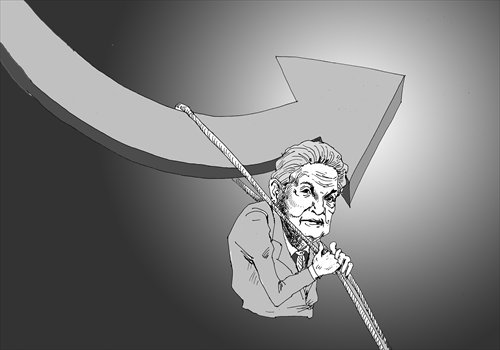Soros’ pessimism about China lacks factual basis

Illustration: Luo Xuan/GT
What is the key warning we can read into billionaire investor George Soros' recent comments about China's economic problems and betting against Asian currencies? It is not about his claim that China's economy is headed for a hard landing, because this view does not hold up. Although China's economy grew 6.9 percent last year, the slowest pace in 25 years, the growth rate is still enviable compared to that of other big powers. The US saw its GDP rise by 2.4 percent in 2015, less than half of China's GDP growth.
China's robust consumption growth is another factor that makes a "hard landing" unlikely. US consumer spending, which is regarded as the strongest pillar of the economy, increased at a rate of 2.2 percent in the fourth quarter, down from the 3 percent pace posted in the third quarter.
But retail sales in China, a key indicator of the country's consumption, grew 10.7 percent year-on-year last year, far higher than the US figures. Therefore, it is undoubtedly absurd to claim China's economy is heading for a hard landing, as it can support consumption growth that is triple that of the US.
What matters most is that China's economy is undergoing a process of creative destruction with emerging industries thriving despite the current slowdown and some traditional industries operating at less than full capacity. The country's industrial output rose 6.1 percent year-on-year in 2015, while the output of high-tech industries expanded by 10.2 percent.
Investment in the country's steel and coal industries dropped by 11 percent and more than 14 percent respectively last year, but investment in the computer, electronic and telecommunication equipment sector grew 13.3 percent and investment in pharmaceutical manufacturing rose nearly 12 percent. Even in the traditional industries that are burdened with overcapacity, increasingly cutthroat competition is screening out the worst and retaining the most competitive companies. Development of China's emerging industries has also received strong support. In 2015, the country's research and development (R&D) expenditure amounted to 1.43 trillion yuan ($217.42 billion), double that of 2010, with corporate R&D expenditure accounting for more than 77 percent of the total.
The key warning is also not about China passing deflation on to the rest of the world. In his interview with Bloomberg during the World Economic Forum in Davos, Switzerland in late January, Soros claimed that the three major root causes of the current uncertainty are concerns about China, oil and raw material prices and competitive currency devaluations.
However, the theory about China exporting deflation is quite confusing. As the world's largest energy and raw material importer, China is the importer of current deflation rather than the exporter of it. Also, given the rising labor costs in China, the country is actually weakening the global deflationary pressure.
During the ongoing global deflation period, China's producer price index and purchasing price index have declined continuously for several years and the purchasing price index is lower than the producer price index. For instance, the purchasing price index dropped 6.1 percent in 2015 from a year ago, while the producer price index fell 5.2 percent. These figures showed China is an importer of deflation rather than a nation transmitting deflation to the rest of the world.
In fact, China has actually helped ease the global deflationary pressure, because the domestic job market has been vibrant in recent years. The continuous rise in salaries paid in China has to some extent offset the impact of the fall in global energy and raw material prices. It also contributed to the rise of consumer prices being faster than the rise in services prices for three years in a row. China's registered unemployment rate in urban areas stood at 4.1 percent, 4.1 percent, 4.05 percent and 4.09 percent in the years from 2011 to 2014. In 2015, the figure was 5.1 percent.
What is more important is that the root cause of deflation and inflation is changes in monetary supply. Inflation that happened in previous years was caused partly by the US Federal Reserve's quantitative easing policy, while the current deflation is a result of the Fed's tight monetary policy. Although the influence of China's central bank policy on the changes in global monetary supply has grown bigger, it still cannot rival that of the Fed.
Therefore, Soros' warning is relevant to other emerging economies rather than China. In the Bloomberg interview, he claimed that "a hard landing is practically unavoidable" in China, but he also said that "China can manage it. It has resources and greater latitude in policies, with $3 trillion in reserves." Therefore, those that will suffer most from possible speculative currency attacks are not China but emerging markets. Given such possible attacks, it is the right time for China and other emerging markets to strengthen financial cooperation and eliminate any loopholes that speculators such as Soros could use to wage attacks on their currencies.
The author is a research fellow with the Chinese Academy of International Trade and Economic Cooperation. bizopinion@globaltimes.com.cn